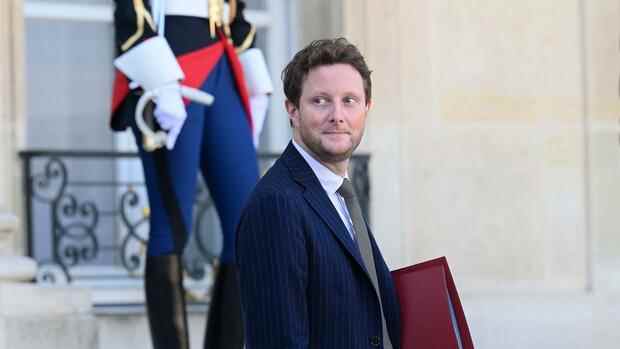The main act of the two-hour event then belonged to Macron. The head of state played his most famous European hits: more sovereignty for the EU, industrial policy initiatives for a green and digital economy, a revision of the budget rules in the euro zone.
But Beaune’s supporting role on that Thursday afternoon in mid-December was deceptive: the 40-year-old is the most important puller in the ambitious European agenda of the president.
Even when Macron was Minister of Economic Affairs, Beaune traveled and worked on the European Union for him. After the 2017 election victory, the new president brought his confidante, four years his junior, to the Élysée Palace as a Euro-political advisor. As one of his first official acts, Beaune took part in the Sorbonne speech in which Macron outlined his vision for the future of Europe.
Top jobs of the day
Find the best jobs now and
be notified by email.
For a long time he mainly worked in the background, preparing the presidential advances in Brussels and establishing networks in the European capitals. For Beaune, Franco-German cooperation is central. When Macron received the then Chancellor Angela Merkel on a farewell visit to the Burgundy wine region at the beginning of November, the Secretary of State for Europe was one of the guests of honor.
The change of government does not change anything about his good contacts in Berlin. After the negotiations between the SPD, Greens and FDP had been concluded, he welcomed the “very good coalition agreement”. Beaune also encouraged Macron to pay more attention to smaller EU countries and Central and Eastern Europe. In a recent interview, he recalled that Macron was the first French president to visit all 27 EU countries in one term of office. “It would be a mistake to think that Germany and France would decide for the other,” said Beaune.
Change from top official to politician
Since his appointment as State Secretary in the Ministry of Foreign Affairs in July 2020, Beaune has been increasingly transforming itself from top official to politician. Macron grants his “Monsieur Europe” public leeway like hardly any other member of the government of comparable rank. And it is not uncommon for the president to send his state secretary forward on sensitive European issues.
This was particularly felt by the British government, with which Beaune repeatedly quarreled in disputes after Brexit. Most recently, he fought with London in the autumn about the issue of fishing licenses. He is now referred to in the British media as “Macron’s attack dog”.
This description doesn’t actually fit Beaune’s rather shy demeanor and youthful appearance. Perhaps the nickname given by the British suits him, because he wants to get rid of his reputation as “Macron’s model student”. “Maybe because that’s me,” Beaune told the newspaper “Le Monde” about his good image. He prefers the image of the “good soldier”.
After the 2017 election victory, the new president brought his confidante, four years his junior, to the Élysée Palace as a Euro-political advisor.
(Photo: Reuters)
A year ago, Beaune caused irritation in Berlin when, in a radio interview, he called for the controversial German-Russian gas pipeline Nord Stream 2 to be abandoned. “France has always had the greatest doubts about this project,” he said after the attack on Russian oppositionist Alexei Navalny. It is difficult to imagine that this swipe at the federal government was not discussed with Macron.
Protection of the rights of sexual minorities
Beaune regularly criticizes “governments that question the fundamental values in Europe”. He is referring to Poland and Hungary in particular. A very personal concern for him is the protection of the rights of sexual minorities – Beaune is homosexual.
When the State Secretary traveled to Poland last March, he also wanted to visit the city of Krasnik, which had declared itself an “LGBT-free zone”. In the end, the visit to Krasnik was canceled, according to Beaune because of political pressure from the Polish government.
The son of a professor and a nurse grew up in Paris. He spent his academic years in the institutions that usually mark a steep career in French politics and administration: he attended the Sciences Po University in Paris and the ENA School of Administration.
Macron also went through this elite educational path. Beaune also gave his biography a European note: he studied with the Erasmus program in Ireland and also graduated from the College of Europe in Bruges, Belgium.
Beaune is said to have ambitions for higher political offices in the next government, should Macron be elected for a second term in the presidential election in the spring. There is also speculation that he will run for Macron’s party in the next general election as a candidate in a constituency. With that, Beaune would complete his transformation from technocrat to politician.
More: How Macron’s France is fundamentally changing the EU
